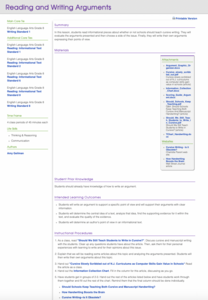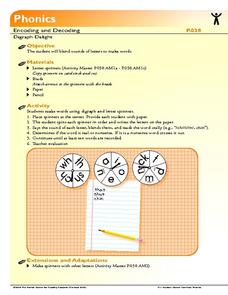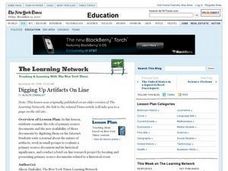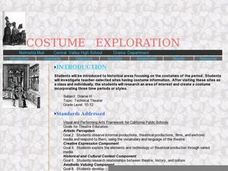Stanford University
Evaluating Historical Sources on Juana Briones
Most have never heard of Juana Briones, the incredible woman who came to own property and divorce her husband in 1850s California. Yet, her relatively unknown life reflects the historical dynamics of the American West, particularly those...
EngageNY
Performance Task Preparation: Peer Critique and Mini-Lesson Addressing Common Errors: Revising Draft Essay to Inform
Time to revise! Using a writing evaluation rubric, scholars participate in a peer editing process to provide feedback on each others' informative essays. Next, pupils begin revising their drafts based on the feedback they receive.
EngageNY
Planning for Writing: Introduction and Conclusion of a Literary Analysis Essay
First and last impressions are important. Using the helpful resource, scholars draft the introductory and concluding paragraphs of their literary analysis essays. Next, they use a writing evaluation rubric to self-assess their work.
Curated OER
Writing a Screenplay
It's time to make a movie! Kids follow 15 steps to take their movie ideas from concept to script, following clear examples. The resource includes creative ways to guide learners into developing a few words and concepts into fully...
iCivics
Drafting Board: Interest Groups
Does the influence of interest groups harm a political system? Your class members will analyze the role of interest groups in American politics, as well as consider the effect of perspective, bias, loyalty, and the First Amendment.
Curated OER
Writing Formal Letters
Help your young writers recognize the importance of composing formal letters. Middle schoolers read letters written by Thomas Jefferson and analyze the components that make it a formal letter. They will then compose their own letters.
Curated OER
Reading and Writing Arguments
Should schools continue to teach cursive writing? After reading and considering the merits of a series of arguments on both sides of this proposition, class members choose a side of the issue and craft their own argument, drawing support...
Digital Writing and Research Lab's – Lesson Plans
Teaching Close Reading through Short Composition/Revision
This activity may have writers evaluate short compositions, but their subjects are quite tall: great Americans. Pupils read one another's compositions and closely examine how specific phrases and diction contribute to shaping American...
Florida Center for Reading Research
Phonics: Encoding and Decoding, Digraph Delight
There are three spinners to use in this phonic activity. Spinner one contains digraphs, spinner two contains vowels, and spinner three contains consonants. Learners spin each spinner, write down the letters they get, blend them to make a...
EngageNY
Evaluating Sources, Continued: The ONLINE EDUCA Debate 2009 (Part 2 of 10)
Watching videos and playing online games can be educational, but too much screen time has its drawbacks. Pupils watch a video about the topic and write down the claim, reasons, and evidence in support of reduced screen time for children....
Curated OER
Information Shuffle
Gather some information, print it onto sentence strips, and then have your class physically shuffle the cards to better understand the importance of organizational patterns in writing. Middle school learners examine information for a...
Curated OER
Can Scientists Discover a Limit to Discovery?
Is there anything left to discover? Evaluate opposing sides of the debate regarding whether or not there is a future for scientific discovery. Middle and high schoolers assess quotations from the articles included to evaluate claims and...
Curated OER
Magazine Production
Analyze magazines as a class, looking carefully for the target audience, advertisements, and topics presented. Small groups then work as a publication team and receive a magazine that they have to "sell." Each individual has a different...
Curated OER
Digging Up Artifacts On Line
Why is it important to preserve historical documents and artifacts? Examine the role of primary source documents and the availability of these documents on the Internet. Middle and high schoolers write a journal about the nature of...
Curated OER
Family Life
What is family? Challenge your scholars to write an encompassing definition of what this word means to them. After reading "It May Be a Family Matter, But Just Try to Define Family," class members discuss the emotional issues surrounding...
Curated OER
Costume Exploration
What a great lesson plan, upper graders are sure to love. They explore costume design and the relationships between theatre, culture, and history. They research three time periods, write a response about two of them, then create a...
Curated OER
The BEAM Project: Building Efficient Architectural Models
Technology or engineering teams are given a task to design, construct, and test the efficiency of a structure that will foster an even temperature throughout an entire sunny day. Intended as a long-term project, pupils research, plan,...
Los Angeles Unified School District
Capitalism and Socialism
Capitalism, socialism, communism ... these may seem like a whole bunch of isms to your scholars. High schoolers won't confuse them after completing an informative resource. Your class masters how to use primary sources to critically...
Turabian Teacher Collaborative
Parts of Argument II: Article Critique
Break down the parts of argumentative writing with a critical thinking activity. High schoolers read an article of your (or their choice), and use a graphic organizer to delineate the ways the author structures his or her arguments.
Social Media Toolbox
Verification
When you're putting together a great story, you've got to consider the source! Scholars discover the dangers of errors in reporting during the 14th activity in a 16-part Social Media Toolbox series. Groups collaborate to create a source...
Turabian Teacher Collaborative
My Favorite Martian: Workshopping Warrants
Sometimes explaining an argument can lead to confusion and miscommunication. Narrow down the details in written arguments with a group activity in which learners pretend to be aliens from another planet, struggling to understand each...
EngageNY
Forming a Research-Based Claim: Cascading Consequences Chart
Can you put that in writing? Scholars work with a partner to write a practice claim before writing their own claims. After writing their claims, learners share with class using a Concentric Circles activity.
University of North Carolina
Audience
Challenging pupils' perspectives by having them walk in the shoes of the reader. An informative resource discusses how to identify an audience and anticipate their needs before writing an upcoming argumentative essay.
Texas Education Agency (TEA)
Evaluating the Effectiveness of Arguments, i.e., Identify Fallacies (English III Reading)
A series of interactive exercises provide users with the ammunition they need to detect logical fallacies and defend themselves against persuasion. Learners read about 11 types of logical fallacies and identify the type used in sample...

























